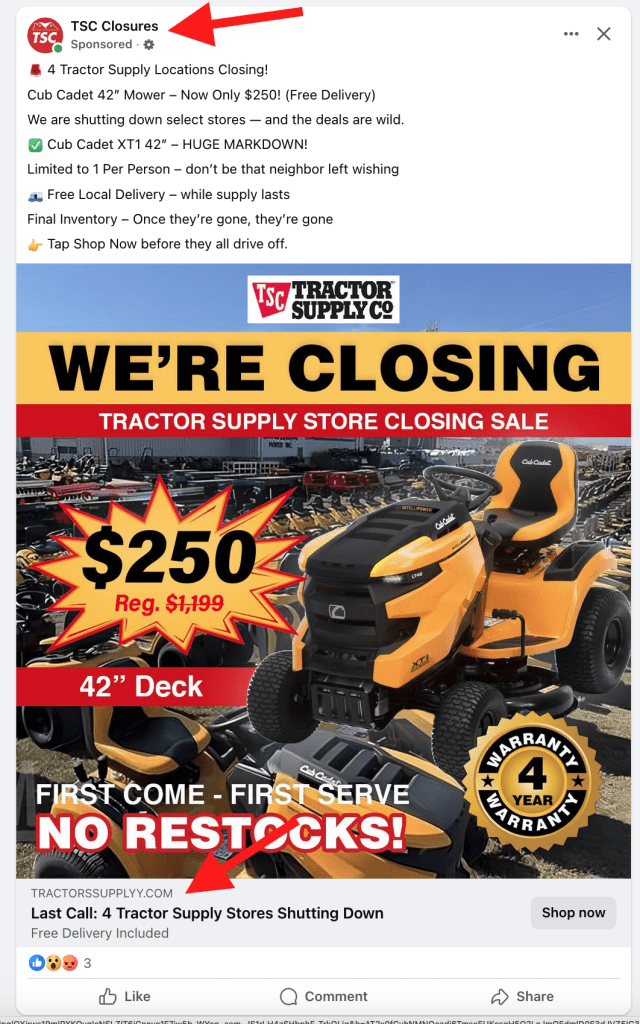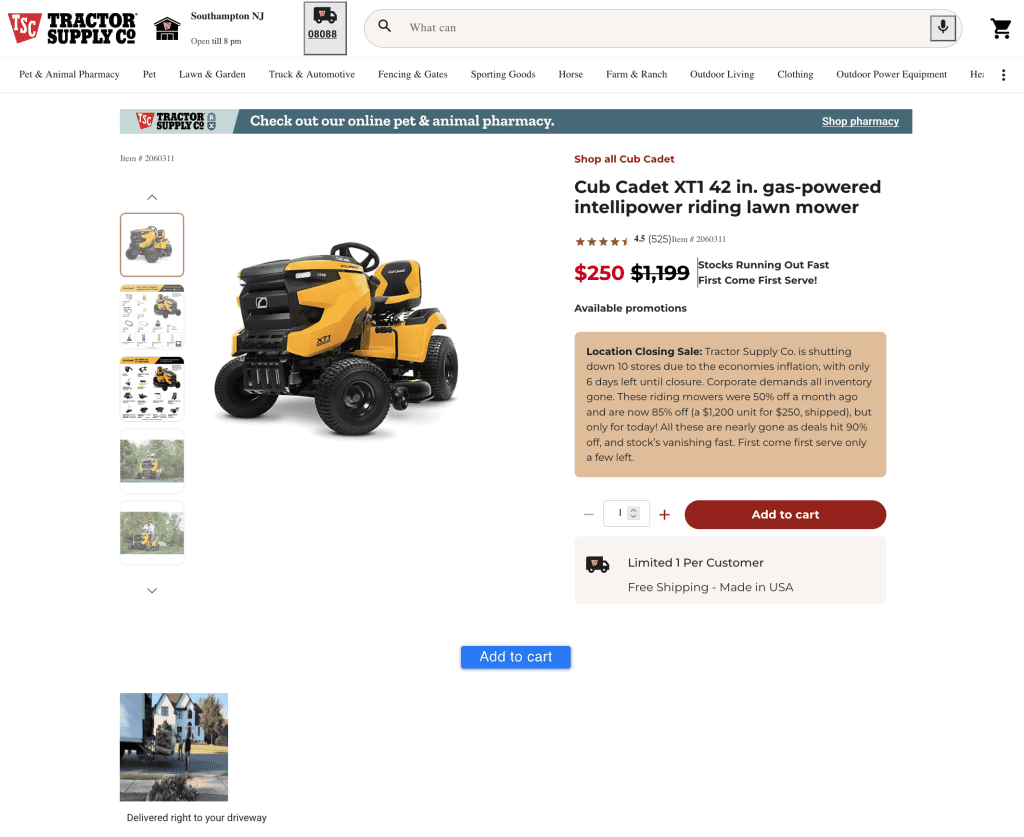>> Click to Summarize this with ChatGPT

A Facebook ad has been circulating this week, claiming that four Tractor Supply locations are shutting down and offering heavily discounted Cub Cadet mowers for $250 with free delivery. The ad is visually convincing, uses familiar branding, and includes a link to what looks like an official site. But it’s a scam.
This post breaks down how the scheme works, how it’s fooling users, and what companies like Tractor Supply can do to stop it before real damage is done.
What the Scam Looks Like
A Fake Page with a Familiar Name
The ad appears under the name TSC Closures, which closely resembles Tractor Supply Company’s identity. The logo is a red circle with white letters—similar enough to fool the casual scroller, but not an actual match. There is no verification badge. The page itself is not associated with the official Tractor Supply brand, yet it uses a nearly identical tone and layout.

The Hook—$250 Cub Cadet Mowers
The product featured is a 42″ Cub Cadet XT1 mower, usually sold at retail for around $1,200. The ad boldly claims “$250—free delivery,” and emphasizes “No Restocks” and “Store Closing.” These are urgency tactics—used frequently in scams—to get people to act without thinking. The promise of free local delivery and limited supply adds to the pressure.
The Domain Name Trick
The real website for Tractor Supply is tractorsupply.com. But this ad links to tractorssupplyy.com, a lookalike domain with an extra “s” and “y.” This is not just a coincidence. It’s a technique called typosquatting, where scammers register URLs that closely resemble a real company’s web address. These domains are created to deceive, not to inform.
On the landing page, the product listing appears legitimate at first glance. The design mimics an e-commerce layout. But the text includes phrases like “due to the economies inflation” and “stock’s vanishing fast,” which make it clear this was not written by a professional or a legal team. These pages often don’t survive long, but they last long enough to collect card numbers or other personal information.
Why This Matters for Brands
The biggest risk isn’t just a customer losing money—it’s a brand losing trust. When users are duped into scams like this, they often blame the brand being impersonated. That erosion of trust can cost companies far more than the scammer ever collects.
What Businesses Can Do About It
Monitor for Suspicious Domain Registrations
Brand owners should be actively monitoring new domain name registrations that resemble their trademarks. There are domain monitoring tools—such as DomainTools, MarkMonitor, and DomainIQ—that can alert you when similar domains go live. Look for typos, added characters, and hyphenated variations.
Proactively Register Typosquats
Because .com domains are not yet part of NameBlock or GlobalBlock protections, the best move is to defensively register the most likely abuse candidates yourself. This includes misspellings, common misreadings, and brand plus coupon or brand plus sale combinations.
Example: If your company is Tractor Supply, consider registering tractorsuply.com, tractor-supply.com, tractorsupplydeals.com, and tractorsupplyclearance.com.
Report the Scam Quickly
If a phishing site is live, there are three immediate actions that can be taken:
- Report the domain to the registrar. Every domain registrar has an abuse contact. You can find this by performing a WHOIS lookup.
- Report the hosting provider. If the site is hosted separately from the registrar, the web host may be able to suspend it faster.
- Report the ad to the platform. In this case, Facebook should be notified using their ad reporting tools.
Get Help If You Need It
If you’re unsure where to start, or the domain owner is obscured behind privacy protection, you can contact us at DNAccess. We specialize in investigating domain abuse and helping brands respond appropriately. That includes registrar outreach, takedown requests, and evidence gathering for legal action if necessary.
This Isn’t Just a Facebook Problem
Scams like this will continue to appear on every platform that allows paid advertising. Scammers thrive in the gray areas—where logos can be copied, names slightly changed, and urgency can replace common sense. Until platforms enforce stricter ad scrutiny, it’s up to users and businesses to spot the warning signs.
There’s no one-size-fits-all defense, but the sooner a brand gets involved, the less damage a scammer can do.
This Facebook ad is not a one-off. It’s part of a larger pattern that takes advantage of visual mimicry, low-priced bait, and rushed decision-making. The clues are there for those who know where to look: a fake name, a deceptive domain, sloppy grammar, and pricing that makes no economic sense.
Businesses can’t rely on luck to protect their reputation. They need to monitor, register key domains, and respond fast when threats appear. Consumers need to verify before buying—especially if a deal looks like it’s too good to stick around.
If you’ve seen this ad or one like it, don’t engage. And if you’re a brand being targeted, take action before your name gets pulled further into the mud.
